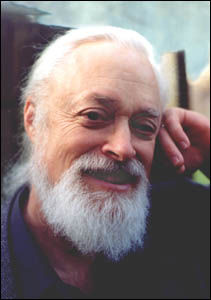I've been doing lots of reading and thinking and conversations for the last several months, but have been longing to get down to this research project really seriously. I think I'll have much more time for it in August (until the Story Field Conference, and a bunch of gigs afterwards, into mid-September), and then late September and most of October, when Michael Dowd's Thank God for Evolution! comes out and things may take off in unpredictable ways.
So... I've read Robert Wright's Nonzero and John Stewart's Evolution's Arrow, and bits of Brian Swimme and Thomas Berry's The Universe Story and Joel Primack's and Nancy Ellen Abrams' The View From the Center of the Universe -- and I just today finished David Sloan Wilson's Evolution for Everyone. And I've read a number of articles and watched Michael Dowd and Connie Barlow's DVDs -- and had many discussions with them and did lots of editing work on Michael's TGFE! book (above). So I'm off to a good start.
During the next week I hope to go through the Wilson book again, mining it for dynamics that could be used to change social systems and/or useful overview theory. Then I'll tackle The Universe Story to expand beyond Darwinian perspectives on evolution into the cosmic realm.
One of my meta-inquiries is "What is the general principle(s) that 'natural selection' is a manifestation of, which applies to non-biological systems, including physical systems starting with the big bang?" Something about the evolution of choice, in the sense of increasing possibilities or options, and the relationship of that to persistence (in biological systems, "survival" and "reproduction"). Like "options that persist tend to interact to generate new options and broader fields of possibility" (a phenomenon which relates to the supposed directionality of evolution towards greater complexity).
Another (related) meta-inquiry comes out of my past as an activist and process/conversation convenor -- a believer in the evolutionary power of conversation to generate emergent phenomena: How do cosmic and biological principles relate to this seeming power of conversation?
Some of this came together this morning in a conversation with my life partner Karen. Here is an overly theoretical model (rather than interesting narrative :( ) of what emerged -- a sort of touchstone of notes to work with more later:
1. GUIDANCE: Genes don't direct how we will relate to our environment. They provide a pallette of options for relating to a range of environments that have been relevant in the past. Traditional knowledge serves the same purpose.
CORROLARY: It isn't a question of nature or nurture, genes or environment. It is a question of how genes (or traditional memes) manifest in or interact with specific environments.
2. STRESS: When we encounter an environment/situation/challenge for which we have no clear option in our pallette of options we
a. FREEZE - deer in the headlights, get stuck, get depressed, are part of systems paralyzed by conflict
b. SUBMIT - to some authority who will decide for us (sometimes wise and kind, sometimes despotic and stupid). Letting go (into mystery, accepting God's will, etc.) is a form of this.
c. REFLECT - through (personal or collective) deliberation, conversation, scientific inquiry, etc., to generate new options for our pallette. This is where intelligence and creativity come in.
Submission and reflection provide leadership that can embody or replace genetic or traditional memetic guidance, while reflection can generate new forms of guidance that become embodied in the traditions and knowledge-bases of (1).
We are nurturing a form of evolutionary leadership that grounds itself in the powers of genetics and tradition while providing wise, compassionate guidance for reflection and the systemic supports for reflection, so that every stress generates new wise guidance.
This represents the evolution of choice -- of the range of choices and where choices come from -- which began with the Big Bang and has come to the place of wise evolutionary leadership that uses interactive process to generate new choices (possibilities) from challenges, diversity, dissonance and stress. (This begins to make sense of Jim Rough's naming his process "choice creating").
Subscribe to:
Post Comments (Atom)

No comments:
Post a Comment